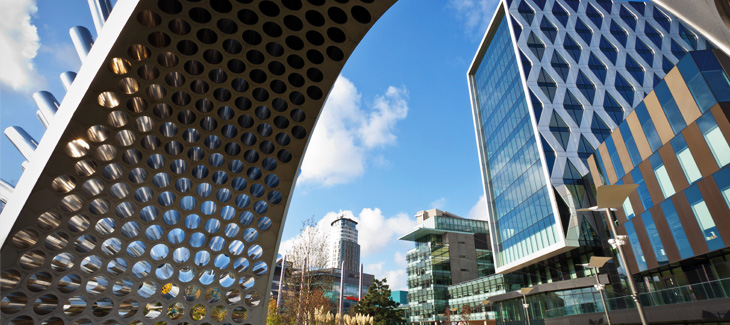University of Salford - School of the Built Environment
Contents |
[edit] Details
School of the Built Environment
University of Salford
4th Floor, Maxwell Building The Crescent Salford, Greater Manchester M5 4WT
Email: [email protected]
Tel: +44 (0)161 295 4600
[edit] Profile
The University of Salford has been recognised by the Times Higher Education (THE) in their list of the top 200 most international universities (196th).
The Built Environment school represents a community of scholars of global reach, working in unison with learners across all levels of study and research, and lifelong learning professionals and organisations committed in making a difference to the sector. With very high employability successes and one of the largest global cohorts of PhD students, many graduates succeed in making a difference in industry and also in academia, by holding leadership positions in organisations and academic institutions across the world.
The School has been leading the research agenda in the built environment for more than 20 years, continuously rated top in the national Research Assessment Exercises. The School has over 1400 undergraduate students, around 600 Masters students, and 240 PhD research students from all over the world.
Continuous Professional Development (CPD) opportunities are provided and the School works closely with professional institutions such as RIBA, CIAT, CIOB and RICS in the provision of CPD and professional training in general. In addition, consultancy services of high value are provided across a variety of sectors such as health, education, infrastructure, the public and the private sectors.
Recently Salford University Careers Office released 2010’s graduate survey results and the School's graduate employability reached 90%.
At undergraduate level the full-time courses offer industrial placement and sponsorship opportunities. Around 65% of graduates achieve a first or 2:1 degree (compared to a national average of 52% in the same subjects), and 96% of graduates find related employment, or go on to further study by the time they graduate.
The School also offers world-class research opportunities for professional development. The research arm is the UK's most successful, and research themes embrace information communication technology, management, and the environment.
[edit] Undergraduate courses
- HNC Construction
- BSc Architectural Design and Technology
- BSc Architecture
- BSc Building Surveying
- BSc Construction Project Management
- BSc Property and Real Estate
- BSc Quantity Surveying
[edit] Postgraduate courses
Featured articles and news
UKCW London to tackle sector’s most pressing issues
AI and skills development, ecology and the environment, policy and planning and more.
Managing building safety risks
Across an existing residential portfolio; a client's perspective.
ECA support for Gate Safe’s Safe School Gates Campaign.
Core construction skills explained
Preparing for a career in construction.
Retrofitting for resilience with the Leicester Resilience Hub
Community-serving facilities, enhanced as support and essential services for climate-related disruptions.
Some of the articles relating to water, here to browse. Any missing?
Recognisable Gothic characters, designed to dramatically spout water away from buildings.
A case study and a warning to would-be developers
Creating four dwellings... after half a century of doing this job, why, oh why, is it so difficult?
Reform of the fire engineering profession
Fire Engineers Advisory Panel: Authoritative Statement, reactions and next steps.
Restoration and renewal of the Palace of Westminster
A complex project of cultural significance from full decant to EMI, opportunities and a potential a way forward.
Apprenticeships and the responsibility we share
Perspectives from the CIOB President as National Apprentice Week comes to a close.
The first line of defence against rain, wind and snow.
Building Safety recap January, 2026
What we missed at the end of last year, and at the start of this...
National Apprenticeship Week 2026, 9-15 Feb
Shining a light on the positive impacts for businesses, their apprentices and the wider economy alike.
Applications and benefits of acoustic flooring
From commercial to retail.
From solid to sprung and ribbed to raised.
Strengthening industry collaboration in Hong Kong
Hong Kong Institute of Construction and The Chartered Institute of Building sign Memorandum of Understanding.
A detailed description from the experts at Cornish Lime.
























